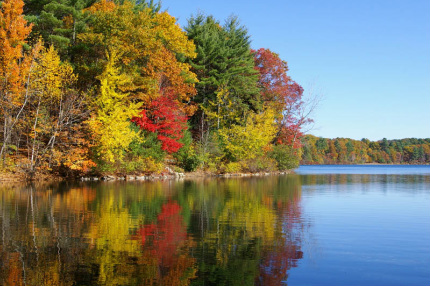Nature is Sacred

"My purpose in going to Walden Pond was not to live cheaply nor to live dearly there, but to transact some private business with the fewest obstacles; to be hindered from accomplishing which for want of a little common sense, a little enterprise and business talent, appeared not so sad and foolish." (17)
Walden, Henry David Thoreau
Transcendentalists strongly believed in the sacredness of nature. Thoreau believed that he had wasted a day if he had not gone for at least a three hour nature walk. He also believed in meditation, and praises it in his book Walden as one of the best ways to spend time. He also praises Walden Pond as "...not very beautiful, does not approach grandeur,... yet this pond is so remarkable for its depth and purity to merit a particular description [and is] a perennial spring in the midst of pine and oak woods." Thoreau praises nature, as other Transcendentalists do, for it offers a promised, unchanging location in a world predicated in change. Walden Pond is pictured to the right, most probably photographed through an expensive camera that all Transcendentalists would scoff at, and although it is very stunning, similar ponds can be found throughout New England. I did not mention this to downplay Thoreau's assertions about Walden Pond, I mentioned it to bring up the fact that had I said this pond was in Connecticut or even Virginia, it would have been believable. From this, it would be easy to say that there is no excuse that people should not be connecting with nature. And after connecting with nature, people will be amazed just like Thoreau at how "it is remarkable how many creatures live wild and free, though secret in the woods" (214). From this connectivity with nature, people would be able to find their location in the world much easier and in turn be much more satisfied with it. Thoreau also touches upon the inability of people to control most aspects of their lives. He believes the only thing people can truly control one thing; their minds. With respect to controlling a potato famine, Thoreau asserts, " While England endeavors to control the potato rot, will not any endeavor to cure the brain rot, which prevails so much more widely and fatally" (304). Although nature receives many praises from Transcendentalists, there exists no accolade amongst them for trying to control it. The only thing people can control, as echoed in many other topics they debate, is their minds. Nature serves as the vessel to do so most efficiently. The main tenet of nature, the Transcendentalists believe, is that by strong association with nature one will be able to understand his over-soul and in turn be able to live a truly successful life, free from the constraints and conformity found in society.
